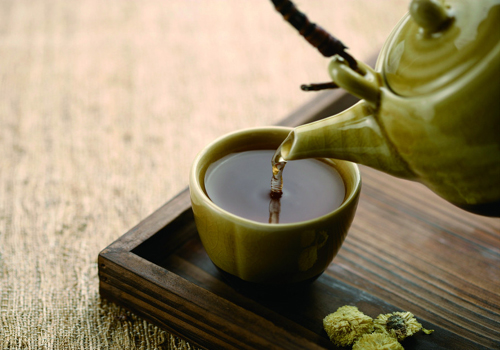 |
| tea culture |
The Chinese, when it comes to drinking tea, place a great deal of significance on the act of "savoring." "Savoring tea" is not only a way to discern good tea from mediocre tea, but it’s also how tea drinkers take delight in the reverie and act itself. Catching a bit of leisure from a busy schedule, making a kettle of strong tea, securing a serene space, and then serving and drinking tea by yourself can help banish fatigue and frustration, and improve your thinking ability and inspire enthusiasm.
The Chinese, when it comes to drinking tea, place a great deal of significance on the act of "savoring." "Savoring tea" is not only a way to discern good tea from mediocre tea, but it’s also how tea drinkers take delight in the reverie and act itself. Catching a bit of leisure from a busy schedule, making a kettle of strong tea, securing a serene space, and then serving and drinking tea by yourself can help banish fatigue and frustration, and improve your thinking ability and inspire enthusiasm.
Tea is also imbibed slowly in small sips so as to appreciate its subtle allure which allows for your spirits to soar higher into a sublime aesthetic realm. Buildings, gardens, ornaments and tea sets are part of the elements that create the ambience for savoring tea. A tranquil, refreshing, comfortable and neat locale is certainly desirable for drinking tea.
Chinese gardens are well known throughout the world that have beautiful landscapes are too numerous to count. Teahouses tucked away in gardens and nestled beside the natural beauty of mountains and rivers are enchanting places of repose where people can find rest and relaxation. China is a country that boasts a time-honored civilization along with a land filled with ceremony and decorum.
Whenever guests visit, it is necessary to serve them tea. Before serving tea, you may ask them their preferences as to what kind of tea they fancy and serve the tea in appropriate teacups.
During the course of serving tea, the host should take careful note of how much water is remaining in the cups and the kettle. Usually, if the tea is made in a teacup, boiling water should be added after half of the cup has been consumed; and thus the cup is kept filled so the tea retains its original bouquet and remains warm throughout the duration it is consumed. Snacks, sweets and other dishes may be served at tea time to complement the tea’s fragrance and to allay a guest’s hunger.
We recommend:
